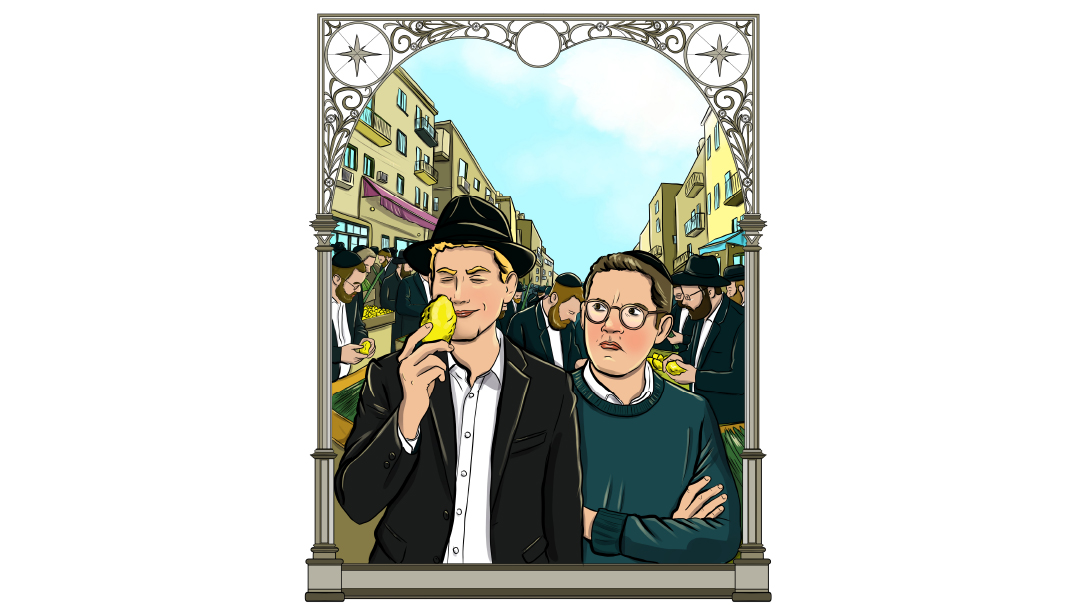Signals


It’s 6:04, and I’m just approaching the turn onto Keren Hayesod. Maybe I’ll make it.
It’s 6:09. Was Derech Chevron always this long?
Now it’s 6:12. Three minutes left. The nightmare is about to come true. I won’t make it. The Monster’s going to win this time, I can see it happening.…
The Monster! With all the strength I have left in me, I sit up, breathing hard, and stare into the darkness. It’s the middle of the night, I’m safe at Saba’s house, nowhere near the train station. But my fear is still there.
Whenever I think about my childhood, it’s always the Sunday mornings I remember — as if there were only one day in the week and morning lasted the whole day. My childhood was an endless series of Sunday mornings, puffing like the old locomotive that lurched into the station and groaned to a halt alongside the platform.
I was very, very tired most of the time back then. A boy in his early teens and already tired of living. No parents, not much family, a grandfather who was supposed to be my guardian but really needed a caretaker of his own. I would watch my classmates running in the schoolyard, shouting and laughing, rolling old tires and flying homemade kites, playing marbles and tossing apricot pits through the hole they’d cut in the top of a shoebox. I couldn’t see what they were all so happy about.
Sometimes a rebbi would pass by and tell me to go play with the other boys. I would shrug my shoulders and stay put. Why should I waste my energy chasing a ball? I had to save it for helping Saba. And running? Just for fun? I ran a marathon every Sunday morning, and it wasn’t for fun.
The train left Jerusalem every Sunday morning at 6:15. After spending Shabbos with my cousins — my aunts and uncles decided it was better for me to spend Shabbos with a real family — I had to get back to Saba in time for school.
I would pack my bag on Motzaei Shabbos with amazing speed, tucking each of my meager belongings into its designated niche. In the morning I’d get dressed, pack the sandwich that was usually ready for me, say goodbye, and start walking.
It was a long way from the center of town to the train station. In the winter the fog would creep over the empty streets, and the rain would wash the pavement, leaving colorful reflections. In the summer, the heat would sprawl over the streets with dusty confidence, making it hard to keep going, hard to breathe. I would walk with a long, quick stride until the road split off into Derech Chevron, and then I’d see it was getting late, my heart would jump, and I would break into a run.
The sidewalk must have remembered me from one week to the next. Here he was again, that boy running in a panic, always a few minutes after six on Sunday morning. I would rush past men on their way to shul and deftly avoid tripping over leashes attached to the four-legged pets of pipe-smoking owners. Often I would cross paths with an Arab peasant trudging along behind a donkey laden with grapes or sweet sabras. I would run past them all in a wide arc, somehow avoiding collisions.
As I came closer to the station, I’d be running as if demons were chasing me. Even the sight of the long building with its arched windows wouldn’t slow me down. I always imagined I heard the train whistle, and I’d speed up even more, until finally I burst into the station like a racehorse passing the finish line. And I’d hope not to run into the Monster.
Now, this Monster I was praying not to meet wasn’t an animal or apparition. He was a tall, broad-shouldered man and seemed to be an employee of the railway, although I had no idea what his job was. All I knew is that he’d always be standing there watching me as I came sprinting into the station. He would tip his hat in a cynical gesture, wink at me, and say through tight lips, “So we’re late for the train again, are we, young sir?”
He’d been calling me “young sir” since the first time I met him, and that was when I dubbed him “the Monster.” I guess his hulking figure, his glee at my near failures, made him monstrous in my eyes.
“Late again, eh?”
He would shake his head and smile maliciously. I would dash past him in the widest arc I could manage under the circumstances, trying to look anywhere but at him, and speed toward the train that stood puffing at the platform.
When I heard that low, indistinct whistle of the train about to depart, I would literally tremble with fear. If I missed that train, I realized, I would have to spend the whole day in Jerusalem, since the next train was only in the evening. Saba wouldn’t know what had happened to me, and I’d miss a day of school.
I ran so frantically that I almost slipped on the platform. Then, out of the corner of my eye, I noticed the engineer ready in his cabin. Our eyes met for a moment, and I thought I saw him nod his head slightly, almost imperceptibly. That tiny human exchange gave me a shot of strength, and taking another breath into my wheezing lungs, I leaped into the first car. The doors closed behind me immediately, the whistle sounded again, and the train pulled out. I sank into the first seat I found, leaned my head back, and allowed the panic to drain out of me. The engineer had waited for me. I was safe.
Saba hosted me every week from Sunday through Friday. “Hosted” isn’t really quite the word. Let’s just say we inhabited the same house.
Saba lived alone in a little house on the edge of the little yishuv of Har Tov. During their good years together, Savta had grown herbs there and a few vegetables, and even after her passing the little plants loyally sprouted their green shoots every year. Now that she was gone, Saba didn’t touch the garden, and it grew wild. Sometimes I wondered if he even noticed the tangle of weeds surrounding the house.
After Savta’s petirah, all the children had invited Saba to come and live with them. He’d refused. “Our house is still standing,” he said. “I see no reason to go elsewhere.”
Much as he insisted on staying there, he really wasn’t quite there. It was as if he’d incurred a massive internal blow and had never quite recovered his senses. Every now and then he would look like someone waking from a dream and ask where Savta was, and every time he heard the answer he would start mourning for her all over again.
Saba didn’t really keep house. The children or grandchildren would come by now and then and put something in the refrigerator, and then perhaps run a mop quickly over the floor and dust the furniture, and Saba himself would pick up a broom once in a while. He sent out his laundry, and once every few weeks a cleaning lady would come and give the windows and floor a proper washing.
No one wanted Saba to be alone. After the car accident that took my parents, they figured I would be the perfect solution. I’d spend Shabbos with my mother’s sister in Jerusalem, to be with a proper family. And then every Sunday, it was back to Saba in Har Tov, to the quiet and disquiet of his eternal mourning.
There were no social workers back then, no awareness of children’s emotional needs. I was fed, I had clothing, I had a roof over my head. My aunts and uncles didn’t realize how much I lacked. Looking back, I think permanence was what I was missing. I had no room of my own, no closet to keep my things in, no permanent address. I was always a guest, arriving with a suitcase, unpacking it wherever I was told to do so, and packing up to leave before I ever began to feel that the space I was occupying was mine. The only permanent fixture in my life was the commute by train, and there the locomotive engineer, with his faint nod in my direction, held a place of honor.
As the months went by, I realized that the engineer at the train station had come to recognize me. When I staggered into the station, huffing and puffing frantically, he nodded at me and smiled. The more I thought about it, the more it warmed my heart to think the engineer really had delayed the train’s departure by 30 whole seconds out of compassion for little anonymous me.
I decided to conduct a tiny experiment and arrive at the station a minute or two later. Maybe I was hoping for confirmation of what I dared to suspect — that I was important enough to make someone who didn’t even know me keep a train full of passengers waiting for me. I wouldn’t really come late, but I would wait for that very last moment, when I would catch the engineer’s eye. I paid no attention at all to the Monster, who still had a comment every time about the young sir who was late again.
The year went by, and Sunday mornings were no longer the terror they had been. Slowly but surely, I started seeing the boys in my class as potential friends and mustered up the courage to start small conversations. When the little conversations blossomed into longer talks and games during recess, I started raising my hand during class too. I’d always been so tired; my world had been an endless and colorless run to the train. Now things seemed different. Something inside me unclenched, slowed down.
It all happened gradually, and at first I didn’t make the connection. But later, when I found myself thinking of the train waiting for me during a bechinah, the engineer nodding at me, making sure I was there before pulling out — then I realized that this little weekly gesture meant much more to me than I’d wanted to admit.
Years passed. Every inch of the pavement on Derech Chevron knew me. The Monster was still a dark cloud in my inner landscape, but I’d learned to focus on the engineer’s smile instead. One day I smiled back at him and nodded my thanks. This would be my last morning on the train route. After the summer break, I’d be transferring to a yeshivah in the north.
As I grew older, more confident, more sure of my own self-worth, Saba’s health steadily declined. When I got engaged, I could still go to him with my kallah to receive his frail blessing, but our firstborn was named after Saba.
At last, I had a home and a family of my own, a permanent address in the north, my own seat in shul, and my own place in the beis medrash. The old Jerusalem-Shfelah train line had been shut down, I heard, and my sweaty marathons to the station faded into the recesses of my memory.
I made a special effort to get to Jerusalem for Saba’s tenth yahrzeit, to daven at his graveside along with the family minyan. I got up early and hurried to the bus station. As my footsteps quickened, those dusty old memories surfaced.
After the visit to the cemetery, I had some time left before I had to catch my bus back to the north. As if my feet had a will of their own, they carried me to Derech Chevron. But this time I walked slowly, noticing all the old landmarks that were still there. And despite my internal and external changes, I think the sidewalks still remembered me.
From the outside, the train station looked as if time had stood still. Only when I went in did I see how it had been abandoned. Weeds were growing out of every crack, and graffiti stood out garishly against the stately stone walls. At the end of the platform a homeless man lay huddled in a threadbare sleeping bag. Ties were missing from the tracks or lying askew, and there wasn’t a train in sight.
A shiver came over me as I stood there beside the abandoned ticket counter. I buttoned up my coat and turned to leave, when I saw a short man walking toward me. His gait was unusual; he moved forward as if on wheels, and his face was vaguely familiar. Our eyes met, and I knew it was none other than the engineer from my boyhood. Suddenly I felt warm and safe again.
“Hello,” I said, giving him my biggest smile. “Do you remember me?”
He stopped and stared at me, puzzled.
“I was the boy who used to run into the station Sunday mornings… and you would…”
And then he smiled.
“Let me guess,” he said. His voice was hoarse, maybe with emotion. “You used to take the 6:15 to the Shfelah every Sunday…. You’d come dashing in, huffing and puffing…”
“And you were the engine driver. And I owe you a big thank-you!”
He tried to protest, but I wouldn’t let him. I launched into a short version of my early life history. I’d been a lonely orphan who was tired of life, I told him, and his kindness had made such a difference. My voice shook a bit when I said, “It seems like a little thing, but the way you waited for me every week — the way you let me know I mattered, I was important — now I realize that you were a major factor in turning my life around. I want you to know how grateful I am.”
He shook his head decisively.
“I’m not exaggerating,” I insisted. “Please, let me say thank you, at least!”
“For what?” Again, he looked puzzled.
“Don’t you remember? You used to nod and smile at me. And you wouldn’t pull out until I was on the train, even though I was always a few seconds late.”
“Yes, I remember it all perfectly. But I never did a thing for you. I was under a lot of pressure in that tight little cabin. I couldn’t play with the departure time.”
“But you waited for me! And you would nod your head and smile…”
“I would nod, yes. And smile? Maybe. But I was nodding at Tobias, the signalman.”
My throat went dry. “Signalman?”
“Yes, the fellow whose job was to let me know that all the passengers had boarded, the exit was clear, and it was safe to pull out. He’d give me the signal, and I’d nod to acknowledge it.”
“Who was this Tobias?”
“You must have seen him. A tall fellow who was always by the entrance to the platform when it was time for a train. I remember now, he would keep me waiting sometimes for half a minute or so before he’d let me out. I didn’t argue with him. He was doing his job, and my job was to wait for his signal and nod.”
I just stood there, stunned.
“I had to wait,” he explained, thinking I hadn’t understood. “You can’t move before you get the message.”
I felt choked up. I bowed my head.
“You’re right,” I said slowly, choosing my words. “That’s exactly how it is. You can’t move before you get the message.
(Originally featured in Mishpacha, Issue 725)
Oops! We could not locate your form.













